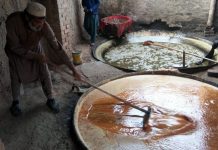Lahore: The production of high delta crops like rice, potato and sugarcane is being criticized by the Water Planners and Environmentalists as the per capita water availability is decreasing rapidly in Pakistan.
According to the experts, world takes these products as luxury crops while Pakistan does not have enough water reservoirs to sustain with these crops under the ongoing production style.
Absence of zoning policy of fields, wrong planning, flood irrigation method, seepage and leakage in canals and fords are the major hurdles in the country to preserve water. According to the experts, even the latest water technology is also unavailable for the production of crops.
Water expert and Environmentalist Prof. Dr. Munawar Sabir told News Lens Pakistan that, “Rice crop needs three times more water as compared to wheat crop. Water shortage has urged the world to discourage the production of potato, rice and sugarcane,” he further stated.
Sabir added, “Many countries have introduced sprinkler and drip drop methods of irrigation to saturate crops. Drip drop irrigation is a way of watering fields through pipes, tubes or valves.”
The Executive Member of Pakistan Water Council Rabia Sultan told News Lens Pakistan that sugarcane was a high delta crop but unfortunately was being cultivated in the areas that were already facing water scarcity.
“Some areas of Central and North Punjab and Sindh are big producers of sugarcane though they have less water availability. Agrarian countries are framing their future according to water availability while Pakistan is still producing water-expensive crops like sugarcane,” she further stated.
For the last two years, 1.2 million tons of sugar had been produced as surplus, sugar mill owner Riaz Qadeer told News Lens Pakistan. Almost 82 mills were working in the country and each mill employed two to three thousand people, he added.
“Sugar mill industry can generate more than three thousand Megawatts electricity if government tries to support us. I disagree to the view that Pakistan was facing water deficiency. We have long rainy season and enough snowfall on mountains. The government must work to prevent seepages, leakages in canals and plan, at the same time, to construct reservoirs for the storage of flood water,” he explained his view.
The Punjab Minister of Irrigation, Mian Yawar Zaman told News Lens Pakistan that government did not have enough funds to cater seepage and leakage problems. “We are trying to take farmers on board to settle this issue as it is impossible for government alone to spend money on this program,” he said.
The Water expert and the member of International Water Institute Dr. Muhammad Shafique told News Lens Pakistan that country had 5000 cubic meters per capita water available in 1947 that, in the present, decreased to 800-850.
“33 million acre feet water is flowing into sea each year as Pakistan has no reservoirs to save flood water. Drought hits when water availability gets reduced to 500 cubic meters per capita and our situation is getting worse day by day. Serious steps for crop planning and preservation of water must be taken as quickly as possible,” he further explained.
The Minister for Agriculture Punjab Dr. Farrukh Javed held that it was almost impossible to convince sugarcane growers to replace this crop with any other as farmers were being paid well by the mills.
“To establish any new sugar mill is banned in Punjab. Even existing mills are not permitted to upgrade their capacity. The government is working on zoning policy. The production of sugarcane, potato and rice will be limited to certain area. Moreover, we will soon start an awareness plan on how to save water for farmers,” he added.
Water experts are also criticizing Rice production. Soil scientist Dr. Muhammad Javed told News Lens Pakistan that areas like Rahim Yar Khan, Bahawalpur, Bahawalnagar and adjacent cities were major rice producers despite having serious water scarcity.
“Only a few farmers are using dripping system in these areas. Cotton and other less water consuming crops should replace rice, sugarcane and potatoes. In addition, water treatment plants can be very fruitful to prevent decreasing water level in urban areas,” he recommended.
The President Basmati Growers Association Hamid Mallih held that country witnessed heavy floods after every two years but not a single big reservoir had been constructed since 1974. “These areas have been producing rice for centuries. Factually, rice industry is giving more than 2 billion dollar every year and millions of people are associated with it directly,” he added.
According to International Commission on Large Dams, Pakistan has 143 small and large dams including Tarbela, Mirani and Sabakzai, but Pakistan seriously requires more big reservoirs.



